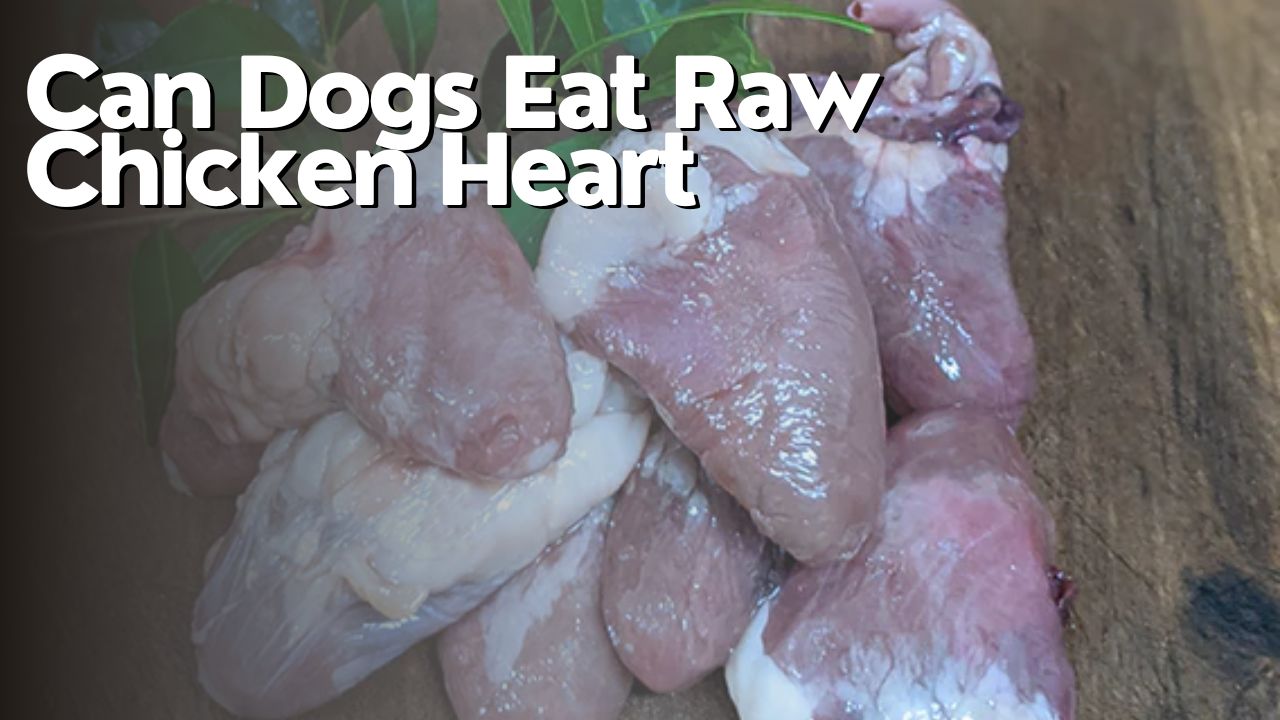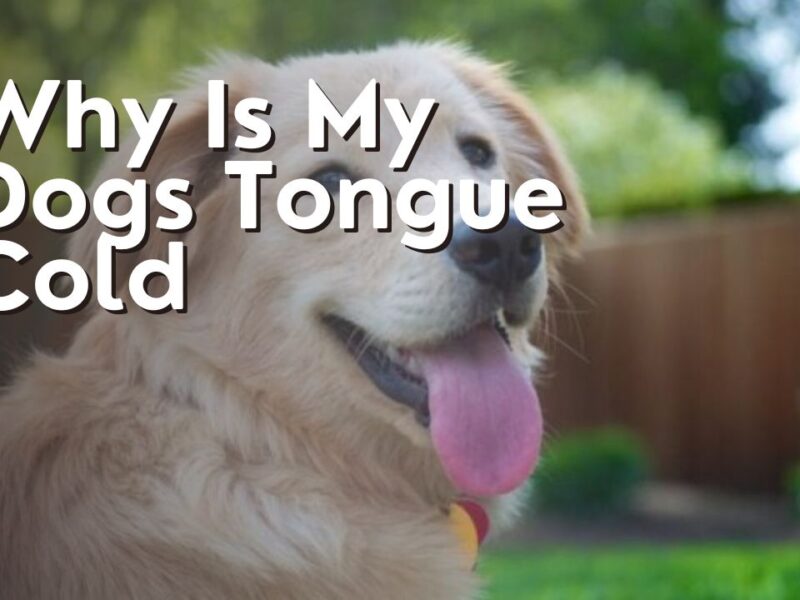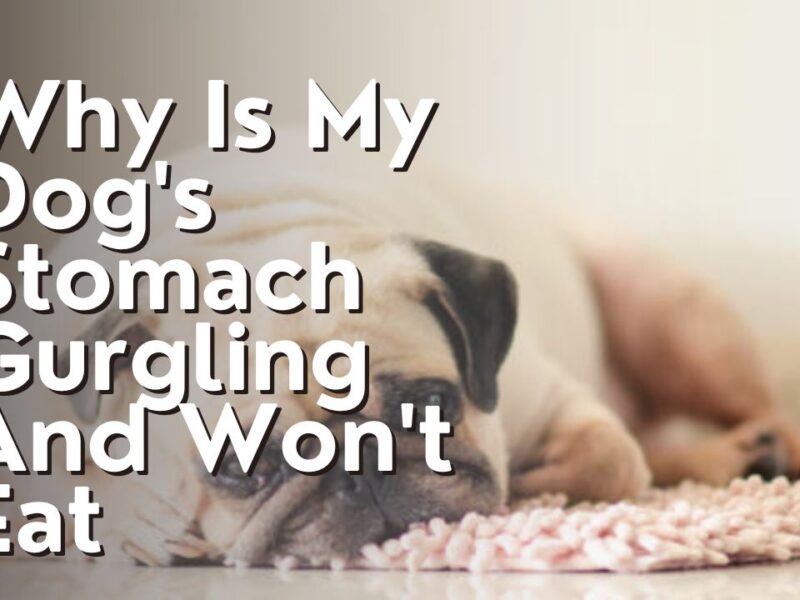Hey there! Have you ever wondered if it’s safe for dogs to eat raw chicken heart? Well, I’ve got some answers for you.
In this article, we’ll explore the nutritional value, potential benefits, risks, and precautions of feeding dogs raw chicken heart. We’ll also discuss the proper preparation and handling techniques to ensure the safety of your furry friend.
Now, I’m no veterinarian, but I’ll provide you with some helpful information to consider. It’s always a good idea to consult with a veterinarian for personalized advice based on your dog’s specific needs.
So, if you’re curious about whether raw chicken heart can be a part of your pup’s diet, stick around and let’s dive into the topic together!
Nutritional Value of Chicken Heart for Dogs
You’ll be amazed at how much nutritional value chicken hearts bring to your dog’s diet! These tiny organs are packed with essential nutrients that can benefit your furry friend’s overall health.
Chicken hearts are an excellent source of protein, which is crucial for muscle development and repair. They are also rich in vitamins B12, B6, and niacin, which support brain function and energy metabolism. Additionally, chicken hearts contain minerals like iron and zinc, which are essential for a strong immune system and healthy skin and coat.
Feeding your dog raw chicken hearts can be a great way to enhance their diet. When served raw, the nutritional content of chicken hearts remains intact, ensuring that your dog gets the maximum benefit from these little powerhouses. However, it’s important to note that while chicken hearts are generally safe for dogs, they should be fed in moderation and as part of a balanced diet.
Too much protein can strain your dog’s kidneys, so it’s important to consult with your veterinarian to determine the appropriate portion size for your dog.
In conclusion, chicken hearts can be a nutritious addition to your dog’s diet. As with any new food, it’s important to introduce them gradually and monitor your dog for any adverse reactions. By incorporating chicken hearts into your dog’s meals, you can provide them with a tasty and nutrient-dense treat that supports their overall well-being.
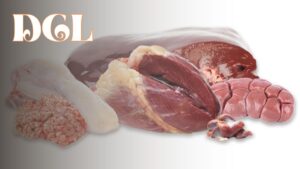
Potential Benefits of Feeding Dogs Raw Chicken Heart
Feeding my dog raw chicken heart has proven to be a beneficial addition to his diet.
Not only is it high in protein and essential nutrients, but it also supports healthy heart function.
Additionally, the chicken heart helps maintain a healthy weight for my dog, ensuring he stays in optimal condition.
High in Protein and Essential Nutrients
Packed with protein and essential nutrients, raw chicken hearts make a nutritious and delicious treat for your furry friend. These small organs are not only a great source of high-quality protein but also contain essential vitamins and minerals that are beneficial for your dog’s overall health. Chicken hearts are rich in iron, which helps in the production of red blood cells and supports a healthy immune system. They also provide vitamins B2, B6, and B12, which are essential for energy production and maintaining a healthy nervous system. Additionally, chicken hearts contain taurine, an amino acid that promotes heart health. To give you a clearer picture, here’s a table showcasing the nutritional content of raw chicken hearts:
| Nutrient | Amount per 100g |
|---|---|
| Protein | 25g |
| Iron | 3.5mg |
| Vitamin B2 | 0.5mg |
| Vitamin B6 | 0.2mg |
| Vitamin B12 | 1.6μg |
Including raw chicken hearts in your dog’s diet can contribute to their overall well-being and provide them with a tasty and nutritious snack option.
Supports Healthy Heart Function
Nourishing your furry friend with this nutrient-rich organ can greatly support their heart health and ensure it functions optimally.
Raw chicken hearts are an excellent source of taurine, an amino acid that is essential for maintaining a healthy heart. Taurine helps regulate heart rhythm and improves overall cardiac function.
Additionally, chicken hearts are packed with protein, which is vital for muscle development and repair.
By including raw chicken hearts in your dog’s diet, you are providing them with a natural and wholesome source of nutrition that can promote a strong and healthy heart.
However, it is important to remember that moderation is key. Too much of any food, including chicken hearts, can upset your dog’s digestive system.
Therefore, it is recommended to consult with your veterinarian and follow their guidance on the appropriate amount to feed your furry companion.
Helps Maintain a Healthy Weight
Eating a balanced diet that includes this nutrient-rich organ can help me maintain a healthy weight and keep those extra pounds at bay.
Raw chicken hearts are an excellent source of protein, which is essential for muscle growth and repair. They also contain important vitamins and minerals like iron and zinc, which support overall health and metabolism.
Additionally, the high protein content in chicken hearts can help me feel full for longer, reducing the temptation to overeat and aiding in weight management.
Incorporating raw chicken hearts into my diet can provide a tasty and nutritious alternative to processed treats or fatty foods, helping me reach and maintain a healthy weight while still enjoying a delicious meal.
Risks and Precautions of Feeding Dogs Raw Chicken Heart
Feeding dogs raw chicken heart can pose certain risks and precautions that pet owners should be aware of.
First and foremost, there is a potential for bacterial contamination in raw meat, including chicken heart, which can lead to foodborne illnesses in dogs.
Additionally, the size and texture of chicken heart can present a choking hazard, especially for small or older dogs.
Lastly, some dogs may have allergic reactions to chicken heart, so it is important to monitor their response and consult with a veterinarian if any adverse symptoms occur.
Bacterial Contamination
To minimize the risk of bacterial contamination, it’s recommended that you thoroughly cook chicken hearts before offering them to your canine companion. Raw meat can contain harmful bacteria such as Salmonella or Campylobacter, which can cause serious health issues for dogs. Cooking the chicken hearts thoroughly will kill any bacteria present, making it safer for your furry friend to consume.
| Bacterial Contamination | Risk for Dogs | Precautions |
|---|---|---|
| Salmonella | High | Cook thoroughly and avoid cross-contamination |
| Campylobacter | High | Handle with clean hands and separate from other foods |
| E. coli | Moderate | Use separate cutting boards and utensils for raw meat |
| Listeria | Low | Store raw meat properly and wash hands after handling |
By following these precautions, you can ensure that your dog stays healthy and free from any bacterial infections. Remember, it’s always better to be safe than sorry when it comes to your pet’s wellbeing.
Potential Choking Hazard
Now, let’s talk about another potential concern when it comes to feeding dogs raw chicken hearts – the potential choking hazard.
As a dog owner, I have always been cautious about the size and texture of the food I give to my furry friend. Chicken hearts, although small, can still pose a risk if not properly prepared or if given to a dog with a tendency to gulp down their food.
The dense and rubbery texture of chicken hearts can make them difficult to chew and swallow for some dogs, increasing the risk of choking. It’s important to supervise your dog while they are eating raw chicken hearts and make sure they take small bites and chew thoroughly.
If you have any concerns about your dog’s ability to handle this type of food, it’s always best to consult with your veterinarian for guidance.
Allergic Reactions
Be aware of potential allergic reactions to this protein-rich treat. Dogs, like humans, can develop allergies to certain foods, including chicken. While raw chicken heart can be a nutritious addition to a dog’s diet, it is important to monitor your pet for any signs of an allergic reaction.
Here are four common symptoms to watch out for:
- Itching and scratching: If your dog starts scratching excessively or develops red, irritated skin, it could be a sign of an allergic reaction.
- Digestive issues: Vomiting, diarrhea, or excessive gas after consuming raw chicken heart may indicate an allergy.
- Respiratory problems: Wheezing, coughing, or difficulty breathing could be a result of an allergic reaction.
- Swelling: If you notice swelling around your dog’s face, lips, or throat, seek immediate veterinary care as it could be a severe allergic reaction.
Always consult with your veterinarian before introducing any new food to your dog’s diet, especially if you suspect they may have allergies.
Proper Preparation and Handling of Raw Chicken Heart
When it comes to feeding my dogs raw chicken heart, I make sure to prioritize safe sourcing and storage. I always buy from reputable sources and keep the meat properly refrigerated or frozen until it’s time to use.
Additionally, I believe in thoroughly cleaning and cooking the chicken heart to eliminate any potential bacteria or parasites that could harm my dogs.
Finally, I practice portion control and ensure that the raw chicken heart is balanced with the rest of their diet to provide them with a well-rounded meal.
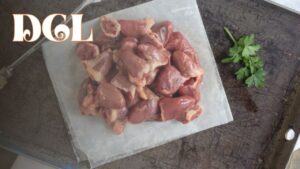
Safe Sourcing and Storage
Dogs can safely consume raw chicken hearts as long as the sourcing and storage methods are proper.
When it comes to sourcing, it’s important to find a reputable supplier that provides high-quality, fresh chicken hearts. Look for suppliers that follow strict hygiene practices and have a good track record of providing safe products.
It is also crucial to store the chicken hearts correctly to prevent any potential contamination. Keep them in a clean, airtight container and store them in the refrigerator or freezer to maintain freshness.
Always check the expiration dates and discard any hearts that show signs of spoilage.
By ensuring safe sourcing and storage, you can confidently feed your dog raw chicken hearts as a nutritious and tasty treat.
Thoroughly Cleaning and Cooking
After sourcing and storing high-quality chicken hearts, it’s time to thoroughly clean and cook them to ensure a safe and delicious treat for your furry friend. Cleaning the chicken hearts is essential to remove any dirt, bacteria, or parasites that may be present. Start by rinsing the hearts under cold water to remove any excess blood. Then, use a clean brush to scrub the hearts gently, paying special attention to the crevices and folds. Once the hearts are clean, it’s important to cook them thoroughly to kill any potential pathogens. You can boil or bake the hearts until they are fully cooked. Avoid using any seasonings or additives that may be harmful to dogs. Once cooked, let the hearts cool before serving them to your pup. Remember to always consult your veterinarian before introducing any new foods into your dog’s diet.
| Pros | Cons |
|---|---|
| High in protein | Risk of bacterial contamination |
| Nutrient-rich | May cause upset stomach in some dogs |
| Natural source of taurine | Potential choking hazard |
| Affordable | Requires time and effort to prepare |
Portion Control and Balance in the Diet
After thoroughly cleaning and cooking the raw chicken heart, I’ve learned that portion control and balance in a dog’s diet are essential.
It’s important to remember that while raw chicken hearts can be a nutritious addition to a dog’s diet, they should not make up the entire meal. Dogs require a balanced diet that includes a variety of proteins, carbohydrates, and fats.
Portion control is crucial to ensure that your dog is getting the right amount of nutrients without overeating. It’s recommended to consult with a veterinarian or a canine nutritionist to determine the appropriate portion size based on your dog’s size, age, and activity level.
By maintaining a balanced diet and practicing portion control, you can provide your furry friend with a healthy and satisfying meal.
Consulting with a Veterinarian for Personalized Advice
Before making any dietary changes for your dog, it’s crucial to consult with a veterinarian for personalized advice. They are the experts who can provide you with the best guidance based on your dog’s specific needs and health conditions.
When it comes to feeding raw chicken hearts to your dog, a veterinarian can assess whether it is safe and appropriate for your furry friend.
Raw chicken hearts can be a nutritious addition to your dog’s diet as they are high in protein, vitamins, and minerals. However, it’s important to ensure that the chicken hearts are sourced from a reputable supplier and handled safely to minimize the risk of bacterial contamination. A veterinarian can guide you on safe handling practices and help you determine the appropriate portion size for your dog.
Additionally, a veterinarian can evaluate your dog’s overall diet and make sure that it is balanced and meets their nutritional requirements. They can advise you on whether raw chicken hearts should be given as a treat or incorporated into your dog’s regular meals. They may also suggest other protein sources or supplements to ensure a well-rounded diet.
Remember, every dog is unique, and what works for one may not work for another. Consulting with a veterinarian is essential to ensure that any dietary changes are safe and beneficial for your dog’s individual needs.
Frequently Asked Questions
Can dogs eat cooked chicken hearts?
Dogs can eat cooked chicken hearts. They are a great source of protein and nutrients for our furry friends. However, make sure to remove any bones and seasonings before feeding them to your dog.
How often should I feed my dog raw chicken hearts?
I feed my dog raw chicken hearts once or twice a week to provide variety and nutrition. It’s important to consult with a veterinarian to determine the appropriate amount and frequency for your dog’s specific needs.
Are there any specific breeds or types of dogs that should not eat raw chicken heart?
Some breeds or types of dogs may have specific dietary restrictions or sensitivities that make it advisable to avoid feeding them raw chicken heart. It’s best to consult with a veterinarian for personalized advice.
Can feeding my dog raw chicken heart cause any digestive issues?
Feeding my dog raw chicken heart can potentially cause digestive issues. It’s important to introduce new foods gradually and monitor for any signs of upset stomach, such as vomiting or diarrhea.
What are some alternative sources of nutrients if I choose not to feed my dog raw chicken heart?
If I choose not to feed my dog raw chicken heart, some alternative sources of nutrients could be other organ meats like liver and kidney, lean cuts of cooked chicken, or commercially prepared dog food.
Conclusion
In conclusion, I have learned that dogs can indeed eat raw chicken heart. It’s not only safe for them, but it also provides them with high nutritional value.
Feeding dogs raw chicken heart can offer various benefits. These include improved digestion, healthier skin and coat, and increased energy levels.
However, it is important to take precautions and properly handle the raw chicken heart to avoid any potential risks. Consulting with a veterinarian is always recommended to ensure personalized advice for your furry friend’s specific needs.
